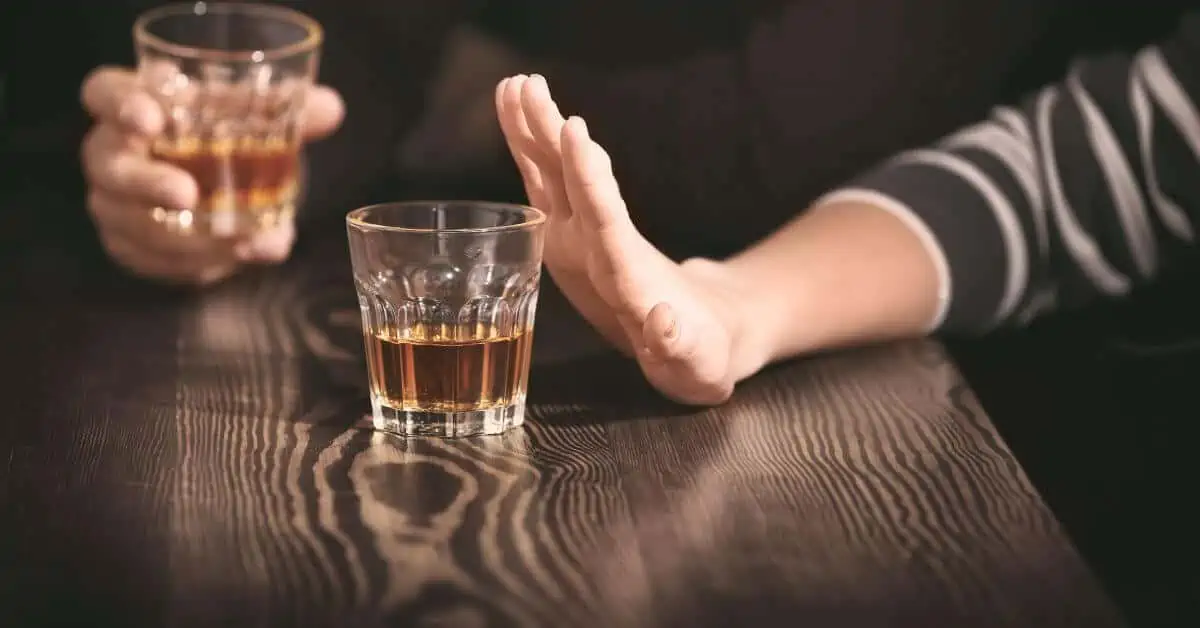When you first met, they were the life of the party. Now, two years in, they not only drink at the party but also at lunch, dinner, sitting around the house, and basically anywhere. What was once considered casually sipping here and there is now your partner consuming excessive amounts of liquor.
It’s common for adults in the United States to consume alcohol at some point. According to Alcohol.org, “for nearly 16 million American adults and about 623,000 adolescents, alcohol misuse leads to addiction.”
So, what should you do when you witness your partner drinking alcohol excessively? First, let’s define excessive. Problem drinking standards vary between men and women. Men contain more water weight and more muscle. Women have more body fat.
Additionally, hormones play a part in how alcohol is processed. Women are also more likely to have a diagnosed mental health condition like depression or anxiety than men. This increases the risk of using alcohol for self-medicating.
- For men, binge drinking is considered 5+ drinks in a two-hour period.
- For men, heavy drinking is considered consuming 15+ drinks each week. This averages to about two drinks every day.
- For women, consuming 3+ drinks daily or 7+ drinks each week is considered heavy drinking.
Ask Yourself a Few Questions
Before discussing how to help your partner stop drinking, you should ask yourself a few questions first. Within the last several months, has your partner:
- Attempted to cut back more than once but couldn’t do it?
- Spent an excessive amount of time drinking or hungover?
- Experienced drinking cravings or urges?
- Noticed their drinking has interfered with family obligations, job, or school?
- Continued consuming alcohol after the issues it caused with friends and family?
- Spent less time on enjoyable activities and more time on drinking?
- Gotten into risky situations more than once after binge drinking (driving, risky sexual encounters?)
- Noticed they need to consume more alcohol to feel its effects?
- Experience withdrawal symptoms when the alcohol effects wear off (irritability, shakiness)?
If you answered yes to one or more of these questions, your partner’s drinking is cause for concern. According to Alcohol.org, anyone meeting two or three of these criteria during a year is considered a mild case of AUD (Alcohol Use Disorder.)
Effects of AUD on Relationships
Researchers link excessive drinking to numerous relationship issues, such as intimate partner violence, increased conflicts, and overall dissatisfaction within the relationship.
The probability of divorce in married couples with one heavy drinker is over four times higher than among the general population. Your partner may also become more isolated and less interested in family activities. Other issues that indicate your partner’s drinking is growing out of control are:
- Lying
- Secrecy
- Financial woes
If your partner exhibits any of these signs, it’s vital they get help. Research shows that partners and children of alcoholics are more likely to struggle with self-worth and confidence. Additionally, they may suffer mental health issues.
Finally, long-term alcohol abuse may lead to dire financial problems and emotional trauma for the entire family.
Their Drinking is Not Your Fault
Regardless of the circumstances, remember it isn’t your fault that your partner is an alcohol abuser. Often family members struggle with the thought of them being responsible. Maybe you believe you weren’t “strong enough,” or their loved one would get better. You may blame yourself, thinking, “I didn’t do enough to stop it.” Or, you believe you are the cause of their drinking. None of these instances are true.
Unfortunately, addiction is a complex disease that’s often linked to childhood trauma or mental health issues. You can’t force someone to drink, and you can’t force them to stop. They make that decision on their own.
Feeling responsible for your partner’s addiction damages you and never addresses the issue. So often, we feel responsible when dealing with a partner who abuses alcohol, and then we end up enabling them.
Their Drinking is Not Your Fault
You aren’t the cause of their behavior, but due to guilt, sometimes we help them continue the damaging behavior. You can avoid falling into the enabling trap by refusing to aid them any longer. Some enabling behaviors include:
- Drinking with your partner
- Handling their responsibilities when they’re drunk
- Ignore the issue
- Setting boundaries but not following through with the consequences
- Rationalizing (“Yes, you did have a hard day.)
- Lying to cover up your partner’s drinking
Unfortunately, slipping into enabling patterns is simple because you love and want to protect your partner. However, long-term speaking, these same patterns are detrimental to your relationship. This is why you not only need consequences; you need to stick with them to show just how serious you are. Without consequences, they have no real reason to alter their damaging behaviors.
Talking to Your Partner About Their Drinking
Starting the conversation can be difficult if you want your partner to cut back or completely stop drinking. It may be even more challenging if your partner is not interested in altering their drinking pattern. Ultimately, it’s a decision they must make. However, you can encourage them.
- Choose to speak to them when you have no distractions.
- If possible, have the conversation when your partner is sober instead of drunk or hungover.
- It helps if you rehearse what you’re going to say beforehand.
- Be calm and composed when approaching your partner.
Keep the conversation focused on the facts. Don’t become overly emotional. If you have specific examples, now is the time to bring them up. State how your partner’s drinking habits impact you and the family. Do not lecture. This can seem condescending and may anger them. Additionally, express your genuine concern for your partner’s health and well-being.
If you know of some, try offering a few options for getting help. Again, this demonstrates the seriousness of the issue and that you’ve done the research and are prepared to get them treatment if needed.
Be prepared because your partner may decide they don’t want to change. If that’s the case, set boundaries and consequences. This can include removing your family from the situation or refusing to cover up for your partner regarding work, family, and friends. This may be difficult, but you need to look out for the well-being of your family.
How To Cut Back on Your Drinking Together
Sometimes, our partner’s behavior mirrors ours. For instance, you complain they drink too much, but you go to the same parties and drink almost as much as they do.
Making a joint plan to cut back on alcohol consumption has the greater potential to be more successful than if you tried to make changes alone.
First, think about the benefits that drinking less has to offer. What might it improve in your relationship? For instance, would drinking less cause you to argue less? Or does it help keep the focus on each other instead of partying? You’d probably sleep better and not be grumpy. Perhaps less drinking would improve your sex life.
Work together and come up with all the benefits less drinking could make to your lifestyle. However, if only you want to change your drinking habits, it may be more persuasive to emphasize the shared benefits than insisting your partner change.
Encourage Each Other
A benefit to making a change with a partner is that they can offer encouragement to you just as you can to them. For instance, if one of you is beginning to lapse, encourage your partner by going out for a walk rather than drinking.
They can also use you as a sounding board. For example, they tell you when they have cravings. Avoid demanding words like “You should do this” or “You can’t do that.” Instead, be more encouraging by allowing them to talk through their feelings. Point out the advantages you both are gaining by drinking less. Continue reminding them why you’ve decided to drink less in the first place and how it benefits your relationship.
Start Feeling the Benefits of Less Alcohol Consumption
It’s a great feeling when you and your partner work together toward a goal and achieve it together. As you start feeling the benefits of the changes you’re making, notice and acknowledge them no matter how insignificant you think it is. Has your mood improved? Did you lose a few pounds? Is the sex awesome?
These are things that you should enjoy together. If you notice positive changes in your partner, tell them. Congratulate each other every time you reach a milestone. Celebrate every win with something special. For instance, after two months of cutting down on alcohol, plan a special long weekend in the country. You’ve worked hard, so enjoy it.
Supporting Your Partner During Recovery
Congratulations! Your partner has decided to seek help to change their relationship with alcohol. Now, the work begins. Recovery isn’t a one-and-done type of thing. It’s a journey. Just because they have entered a treatment program doesn’t mean you snap your fingers and POOF!, everything is back to normal.
During their excessive drinking stage, the trust may have been broken. Things may have been said that hurt your feelings. Recognize these feelings and address them when the time is right. You and your partner must sort through the stigma that addiction leaves, including working through lingering feelings. For example, your partner may still feel guilty for putting you in this position.
If consuming alcohol was a coping mechanism for another mental or emotional issue, these may surface after your partner stops drinking. You will need to address these also. Other emotions you may encounter include:

- Sadness for what you lost
- Anger for how you were treated
- Fear that your partner could begin drinking again
- Abandonment when your partner left you to deal with everything when they drank
- Resentment for putting you in this position
It takes time to rebuild everything you lost. This may mean starting from the beginning and navigating your way to a new normal for the relationship. You will need plenty of empathy and a healthy dose of communication to make the relationship strong again.
If you become overwhelmed, think about counseling or therapy. Getting outside help through a treatment process can make a huge difference for both of you. You can attend individually or go as a couple.
Other Ideas to Help Your Partner Cut Back or Remain Sober Include: On Healing and Recovery
- Giving your partner space to focus
- Searching for fun (alcohol-free) activities
- Researching more about recovery and addiction
- Using a journal to write down your feelings
- Being patient and understanding with lifestyle changes (declining a party with alcohol)
- Practicing self-care, especially when you feel overwhelmed
Practice Self-Care
Living with an alcohol abuser is difficult. Loving one is even more challenging. It can be stressful and draining and cause long-term damage to the relationship. Stop putting the focus on your partner. Instead, learn to give some attention to yourself. This is the time you want to attend to your needs.
If you haven’t already, you may want to consider joining a support group for friends and family of alcoholics. If you prefer a more intimate setting, try discussing your feelings with trusted people like friends, mentors, or religious leaders. In addition, try relaxing activities like painting, walking, yoga, or meditation.
Alcohol abuse can creep up over time, and you may not notice it immediately. Often, it takes one or two significant incidences to realize that your partner may be drinking too much. As soon as you notice, don’t wait. Ignoring the issue may cause it to get worse over time. Instead, address the problem and offer your assistance. Remember, you can’t make your partner change if they don’t want to. However, you can always encourage them.
